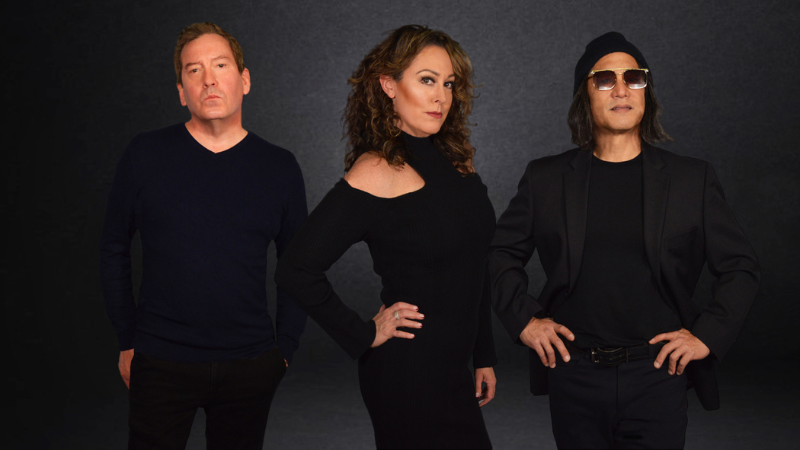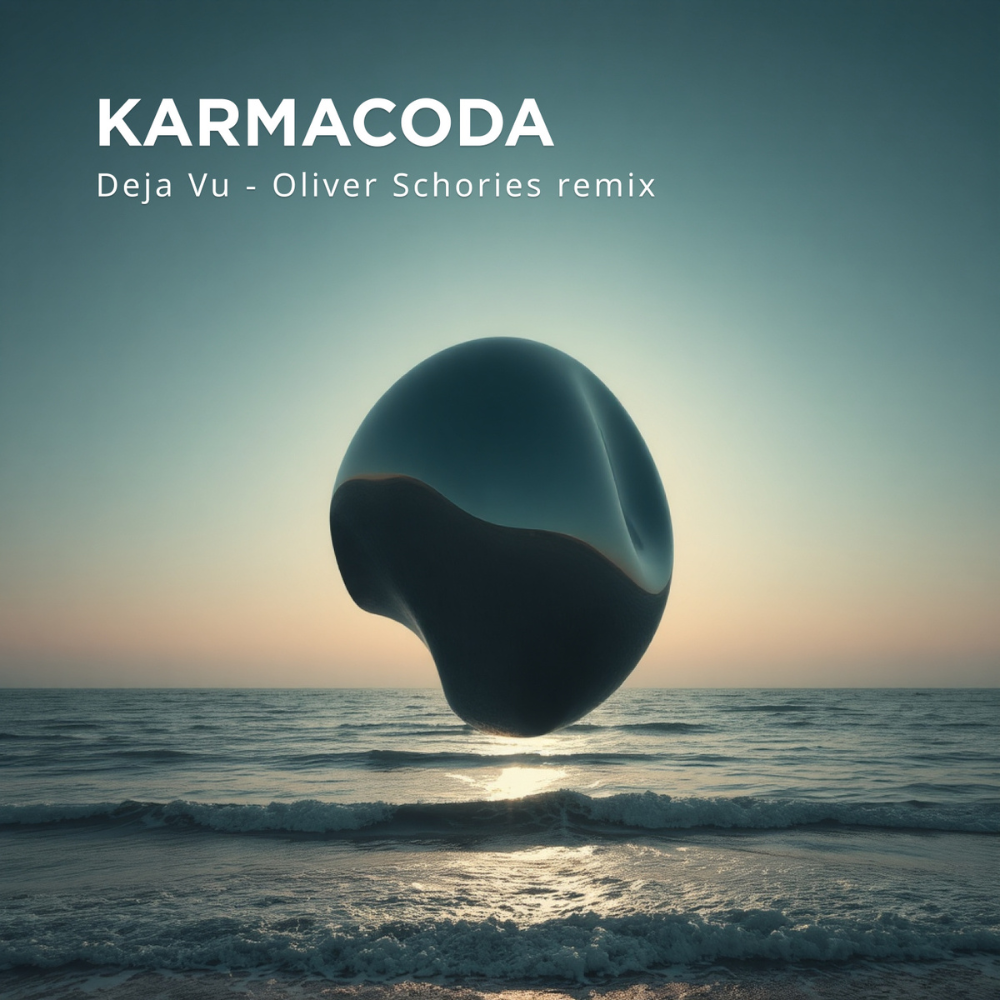modern yet deeply moving and emotional
KARMACODA has a sound that pulls you in and doesn’t let go. Blending electronica, R&B, trip-hop, and pop, they craft music that feels both cinematic and deeply personal. When I heard Oliver Schories’ remix of “Deja Vu,” I knew I had to learn more. The original already carried a haunting energy — Oliver’s version elevates it to a whole new level.
In this interview, we dive into the story behind “Deja Vu,” explore what makes a remix stand out, and discuss how KARMACODA continues to evolve while staying true to their signature vibe. Whether you’re a longtime fan or discovering them for the first time, this is your chance to step behind the curtain of one of the most genre-defying bands making music today. It’s my pleasure to introduce you to KARMACODA.
“Deja Vu” is a standout from Lessons in Time. What was the inspiration behind the original track, and how did you approach its production?
“Deja Vu” is a song about travel: through a garden or traveling by plane to a faraway place each with a sense of dread lurking in the background. Every time we go someplace new we think about what wonderful things we’re about to see and do or counter to that what could go wrong. The production was designed to convey that sense of unease.
What do you think makes “Deja Vu” such a strong candidate for a remix in the melodic house space?
A great remix needs a strong vocal to anchor it and I think “Deja Vu” has a wonderful vocal by Jessica.
How did the collaboration with Oliver Schories come about? Was there a particular reason you wanted him to remix this song?
For us, remixes are all about connections. We or someone on our team may know of someone who we think could take the original song is a new wonderful direction and Oliver’s work fits that criteria.
Oliver described his remix as enhancing the “hypnotic vibe” of the original. How do you feel his interpretation transformed the track?
Oliver totally got the hypnotic vibe of the original and added a fantastic energy that we thought enhanced the song.
When listening to Oliver’s remix for the first time, what were your immediate reactions? Did anything surprise you?
We loved the remix as soon as we heard. I loved the strong piano chords and the amazing use of novel synthesizers. Plus that beat, it really gives a drive that isn’t in the original.
Were you involved in any part of the remixing process, or did you give Oliver full creative freedom?
Oliver had full creative control over the remix. We just gave him the original stems and he took off from there. That’s the thrill of doing a remix, to hear where a talented producer/artist like Oliver will take the song.
Your original version of “Deja Vu” has a rich, emotive atmosphere. How do you feel Oliver’s remix enhances or reshapes the song’s energy?
Oliver took the original song’s emotion and amplified them. It’s the same song only with more drive and sonic goodness.
This remix aligns KARMACODA with artists like Adriatique, Ben Böhmer, and Artbat. How do you feel about bridging the gap between your signature sound and the electronic dance scene?
We’ve always done and loved remixes because it shows another side of the band and exposes our mellower songs to a new audience who loves dance music.
With Schories’ reputation in the melodic house scene and support from Mixmag, Deep House Amsterdam, and When We Dip, how do you see this remix expanding KARMACODA’s audience?
Our core audience are those people who love our moody, chillout electronica vibe and Oliver’s remix exposes our music to those people who are more into dance music.
What has the response been like from your fans regarding this remix? Do you see it attracting a new audience to KARMACODA?
We’ve gotten an amazing response on streaming services and radio with Oliver’s remix and it is definitely exposing us to a new wider audience.
Do you see yourselves exploring more remixes in the future? Are there any other producers you’d love to work with?
Definitely. In fact we have a new remix dropping in about a month.
Your latest album, Lessons in Time, reflects on personal experiences and memories. How did the process of revisiting these moments influence the songwriting and overall theme of the album?
Each song starts with the music, basically a musical sketch Brett “B.” Crockett the producer writes. The emotions evoked by that demo then leads the direction of lyrics and vocals and additional musical parts.
KARMACODA has a rich history blending genres like electronica, trip-hop, and R&B. How does “Deja Vu” fit within your evolving sound?
“Deja Vu” definitely fits into our genre bending sound. I would say that “Deja Vu” is R&B and more in the electronica zone.
Your music is often compared to artists like Massive Attack and Portishead. Do you find those comparisons fitting, or do you see your influences differently?
We started being inspired by those bands but now I feel we’ve added more soul and R&B influences. We’ve been called “cashmere electronica” by reviewers. We think that fits.
KARMACODA’s music blends elements of electronica, R&B, rock, and pop, creating a unique and emotive sound. Can you share how your diverse musical influences have shaped the band’s evolution over the years?
We’re constantly listening to both older music and what’s new and fresh and think “how can we incorporate that into the KARMACODA vibe and make it ours?”
Your October 2022 album, Lessons in Time, features personal reflections from vocalist Jessica Ford. Could you share more about the experiences that influenced the songwriting on this album and how they shaped its overall narrative?
B. the producer writes the first demo and then for the song Jessica’s sings on, she sees what emotions and memories that music evokes and then writes what moves her.
The band’s lineup has evolved since its formation in 2000, with Jessica Ford joining as the lead vocalist in 2015. How has this change impacted KARMACODA’s musical direction and creative process?
We’ve worked with a number of talented singers and each one brings their own style and direction to the band. It’s fun creating music for each singers unique voice and style.
Many of your songs have cinematic and emotional depth. How do you balance storytelling with electronic production?
KARMACODA’s music has always been about creating music that grabs the listeners attention “hey I haven’t heard that before” and combining it with really beautiful vocals. If a song doesn’t create pictures in your mind, through the music and lyrics, then we don’t think it’s working.
Your songs have been featured in film and television soundtracks. What do you think makes your music so cinematic, and is that something you intentionally craft when writing and producing?
We love soundtracks and film sound and that influences our sound greatly. It’s about conjuring images when you hear our music.
You’ve had your music featured in film and TV scores. Have you received interest in licensing this remix for media projects?
Not yet, but there’s still time!
The “Lo-Fi Girl” music video received Silver and Bronze The Telly Awards in June 2022. Can you discuss the creative process behind this video and what these accolades mean to the band?
We reached out to an animator in India and gave him a script written by B. and a general sense of the art direction and what we got was really amazing and fresh.
In December 2022, KARMACODA released a music video for “Time Flies,” directed by Gianfranco Bichine using a vintage Pixelvision PXL2000 camera. What inspired the choice of this unique filming technique, and how does it complement the song’s dreamy, surreal quality?
We’re big fans of cinema and experimental cinema and techniques. Somehow we just thought the Pixelvision camera fit the vibe of the song.
With a career spanning over a decade and seven studio albums, how has your creative process evolved from your early days recording at The Amsterdam Room to now?
We stay open to new music and what moves us and see where it takes us. You have to be open to new sounds, new production techniques and don’t be afraid to play in that space.
The pandemic and California wildfires heavily influenced Slow Down, Melt and Catch Fire. How did these events shape the lyrical themes and emotional tone of the album?
We were in lock down and really only communicated through texts and email as a band. We were kind of thrown by the pandemics and remarkably became super production during that time. We’ve never written an album as quickly as Slow Down, Melt and Catch Fire.
KARMACODA’s live performances have been described as more akin to a rock show than a DJ set. How do you translate the emotional depth and intricate production of your studio recordings into an electrifying live experience?
Basically by putting the energy on the stage. We’re not standing behind a bunch of keyboards and synths, we’re playing guitars and moving around.
Given your previous recognition from CLASH Magazine, Wonderland Mag, and NPR Music, how do you think this remix will expand your reach?
We’re seeing a new audience really liking Oliver’s remix and we love that.
What’s next for KARMACODA? Can fans expect new original material, remixes, or live performances in 2025?
We’re always creating and writing so there’s always something brewing. The only question is when is it ready to share with the world.
If you could describe the experience of working on “Deja Vu” and its remix in one word, what would it be?
Invigorating.
We’ve covered a lot today. Thank you for spending time with me. Is there anything we haven’t touched on that you’d like to share?
Thank you for chatting with us, you asked great questions, it was fun!
Thanks again. In all of the interviews I do, I always give the artist the last word. Go.
Be kind to yourself and others. The world needs it.
For more information about KARMACODA, go to:
Website | Facebook | Instagram | X | Apple Music | YouTube | Spotify






